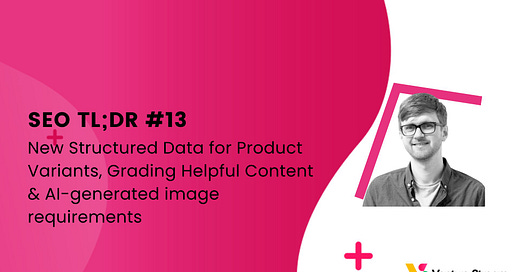SEO TL;DR #13: New Product Structured Data for Variants, Grading Helpful Content & More
SEO TL;DR - 26/02/2024
New Structured Data support for product variants
Last week, Google added new Structured Data support for Product variants, allowing merchants to show more variations of the products they sell, such as size, colour, material, memory size, etc.
This new Structured Data means your product variants may be eligible to show in enhanced Google Search results. This could mean increased visibility for long-tail keywords that don’t appear in the title of the product.
The new format uses the ProductGroup class with associated properties variesBy, hasVariant, and productGroupID to group such variants together. How to implement Product variant Structured Data.
Deciding if content is helpful or not
Ever since Google’s Helpful Content update rolled out in 2023, marketers who were hit badly have been trying to improve or cull content to appease the Google gods. Thankfully, John Meuller has the answer on what is classed as helpful…
“It’s up to you.”
While this answer wound quite a few SEOs up, I like the response and think anyone who expects Google to state explicitly what things it’s looking for may be waiting a long time.
To try and be a bit more helpful, here’s the process I use when reviewing a site’s content.
Firstly, I start with a crawl of the site, using Screaming Frog, which pulls in the usual information such as meta content, headings, and word count plus some additional extractions like authors, publish date, spelling errors and near duplicate content
Then, I connect three APIs - Ahrefs, GA4 and Search Console. This allows me to scrape more information, such as:
GA4: users, views, engagement rate, conversions and so on
Search Console: average clicks, impressions, CTR
Ahrefs: backlinks, number of keywords, keyword value
With this data, you can filter content that has had, for example, no views in the past 12 months, ranks for no keywords, has acquired no backlinks, and is under 200 words. For me, this is usually content that can go straight into the bin.
URLs are then grouped into five main categories and fed back into the content plan:
Delete/remove - poor quality content, probably pulling the rest of the site down in terms of how poor it is
Improve - salvageable content. The information is there, but it’s potentially dated and unhelpful in its current state
Noindex - content that may have to be kept, but there’s no point in indexing. A thank you page, for example.
Consolidate - near duplicate content or content that has been spread over a series of blog posts, which would be better if combined.
Keep - content that is ranking well, up to date, and performing well.
Read more on Search Engine Roundtable on deciding what content is helpful
Google pays Reddit $60M every year
Google reportedly pays a $60 million yearly agreement with Reddit, enabling it to utilize the Reddit Data API to incorporate Reddit's publicly available content more efficiently into Google Search and other products. Despite many SEOs’ reservations about the prominence of Reddit in search results, Google contends this partnership will enrich user experiences by improving the relevance and display of Reddit content. This move aims to leverage Reddit's extensive content for better search outcomes and AI learning without altering Google's current use of public web content.
Meta labels for AI-generated images required in Google Merchant Center
Direct from Google: “If you're using AI-generated images in Merchant Center, Google requires that you preserve any metadata tags which indicate that the image was created using generative AI in the original image file.
Don't remove embedded metadata tags such as trainedAlgorithmicMedia from such images. All AI-generated images must contain the IPTC Digital Source Type trainedAlgorithmicMedia tag. Learn more about IPTC photo metadata.
These requirements apply to the following image attributes in Merchant Center classic and Merchant Center Next:
Image link [image_link]
Additional image link [additional_image_link]
Lifestyle image link [lifestyle_image_link]”
Learn more about product data specifications here.




